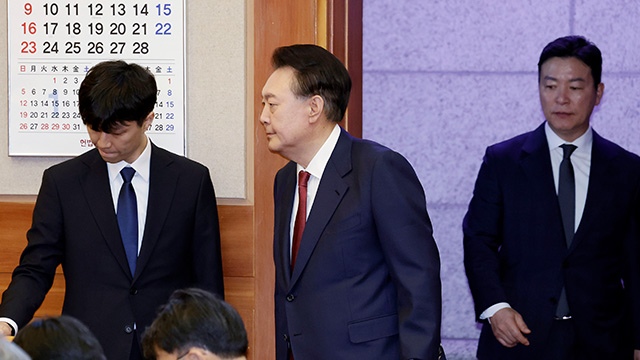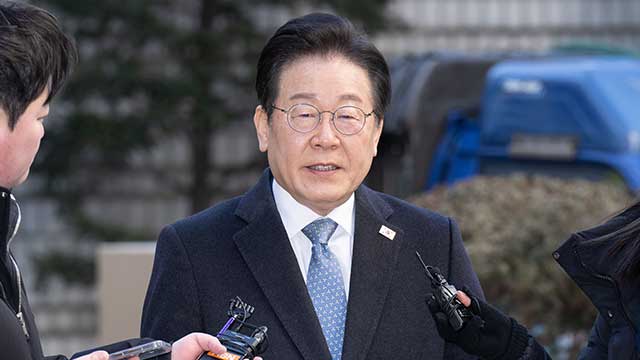[News Today] KOREAN FIRMS MULL RELOCATION
입력 2025.02.04 (15:59)
수정 2025.02.04 (16:01)
읽어주기 기능은 크롬기반의
브라우저에서만 사용하실 수 있습니다.
[LEAD]
In 2018, President Trump targeted South Korean washing machines with high tariffs to support U.S. manufacturers. Korean companies responded by expanding their American factories, turning the tide. Now, with President Trump's recent moves, they are considering moving operations from Canada and Mexico back to the U.S.
[REPORT]
"Come make your products in America."
U.S. President Donald Trump's message is clear.
But to Korean businesses, it's a cumbersome task.
Canada and Mexico have low production costs compared to the U.S.
They have paid almost zero export tariffs and are situated close to the U.S., which makes it easy for them to build factories.
Currently, there are 132 Korean firms in Canada and 92 in Mexico.
In Mexico, Samsung Electronics and LG Electronics manufacture home appliances and send them to the U.S. market. Kia Motors also manufactures its vehicles for the American market in Mexico.
Higher tariffs and the intensifying pressure to invest more in the U.S. are also factors to be weighed.
Korean firms are mulling relocating their factories back to America.
Kim Chang-tae / CFO, LG Electronics
We are considering relocating our production bases and adjusting production
capacity based on our experience of operating factories in the U.S.
But this may only benefit the U.S.
Joo Won / Hyundai Economic Research Inst.
Labor costs in the U.S. are very high. I doubt their capacity to cover high tariffs.
Samsung, which has built a washing machine factory in the U.S., invests not only in factory construction but in many other aspects.
YouTube channel ‘Samsung U.S.’/
But they do more than that. They have given money and equipment to local schools.
Pundits say there needs to be other alternatives in addition to investments in the U.S. market.
Cho Sung-Dae / Korea International Trade Association
Efforts to develop alternative markets should be expanded. One solution is
to produce high value-added products in Korea, provide policy support for R&D.
The trade ministry has convened a meeting of its taskforce on U.S. policy response and vowed to minimize damage by monitoring the situation in major countries and deploying all possible means.
■ 제보하기
▷ 카카오톡 : 'KBS제보' 검색, 채널 추가
▷ 전화 : 02-781-1234, 4444
▷ 이메일 : kbs1234@kbs.co.kr
▷ 유튜브, 네이버, 카카오에서도 KBS뉴스를 구독해주세요!
- [News Today] KOREAN FIRMS MULL RELOCATION
-
- 입력 2025-02-04 15:59:34
- 수정2025-02-04 16:01:02
[LEAD]
In 2018, President Trump targeted South Korean washing machines with high tariffs to support U.S. manufacturers. Korean companies responded by expanding their American factories, turning the tide. Now, with President Trump's recent moves, they are considering moving operations from Canada and Mexico back to the U.S.
[REPORT]
"Come make your products in America."
U.S. President Donald Trump's message is clear.
But to Korean businesses, it's a cumbersome task.
Canada and Mexico have low production costs compared to the U.S.
They have paid almost zero export tariffs and are situated close to the U.S., which makes it easy for them to build factories.
Currently, there are 132 Korean firms in Canada and 92 in Mexico.
In Mexico, Samsung Electronics and LG Electronics manufacture home appliances and send them to the U.S. market. Kia Motors also manufactures its vehicles for the American market in Mexico.
Higher tariffs and the intensifying pressure to invest more in the U.S. are also factors to be weighed.
Korean firms are mulling relocating their factories back to America.
Kim Chang-tae / CFO, LG Electronics
We are considering relocating our production bases and adjusting production
capacity based on our experience of operating factories in the U.S.
But this may only benefit the U.S.
Joo Won / Hyundai Economic Research Inst.
Labor costs in the U.S. are very high. I doubt their capacity to cover high tariffs.
Samsung, which has built a washing machine factory in the U.S., invests not only in factory construction but in many other aspects.
YouTube channel ‘Samsung U.S.’/
But they do more than that. They have given money and equipment to local schools.
Pundits say there needs to be other alternatives in addition to investments in the U.S. market.
Cho Sung-Dae / Korea International Trade Association
Efforts to develop alternative markets should be expanded. One solution is
to produce high value-added products in Korea, provide policy support for R&D.
The trade ministry has convened a meeting of its taskforce on U.S. policy response and vowed to minimize damage by monitoring the situation in major countries and deploying all possible means.
이 기사가 좋으셨다면
-
좋아요
0
-
응원해요
0
-
후속 원해요
0











![[속보] 홍장원, ‘윤 대통령이 체포 지시’ 인정…“싹 잡아들이라 했다”](/data/layer/904/2025/02/20250204_JufT5Q.jpg)



이 기사에 대한 의견을 남겨주세요.